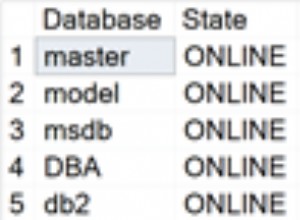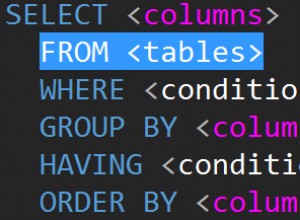Coś takiego:
SELECT first_user.id_user, second_user.id_user, COUNT(first_user.id_user) AS total_matches
FROM likes AS first_user
JOIN likes AS second_user
ON second_user.id_artist = first_user.id_artist
AND second_user.id_user != first_user.id_user
GROUP BY first_user.id_user, second_user.id_user
ORDER BY total_matches DESC
LIMIT 1
Zauważ, że nie jest to bardzo wydajne. Jednym ze sposobów obejścia tego jest utworzenie „tabeli pamięci podręcznej” zawierającej dane wyjściowe tego zapytania z LIMIT 1 porcja usunięta. Dodaj kilka odpowiednich indeksów i wykonaj zapytania do tej tabeli pamięci podręcznej. Możesz ustawić zadanie cron, aby okresowo aktualizować tę tabelę.
Przykład:
CREATE TABLE IF NOT EXISTS `likes` (
`id_user` varchar(50) DEFAULT NULL,
`id_artist` varchar(50) DEFAULT NULL
) ENGINE=MyISAM DEFAULT CHARSET=latin1;
INSERT INTO `likes` (`id_user`, `id_artist`) VALUES ('8', '39'), ('8', '37'), ('4', '37'), ('8', '24'), ('8', '7'), ('4', '28'), ('8', '28'), ('4', '27'), ('4', '11'), ('8', '49'), ('4', '7'), ('4', '40'), ('4', '29'), ('8', '22'), ('4', '29'), ('8', '11'), ('8', '28'), ('4', '7'), ('4', '31'), ('8', '42'), ('8', '25'), ('4', '25'), ('4', '17'), ('4', '32'), ('4', '46'), ('4', '19'), ('8', '34'), ('3', '32'), ('4', '21')
+---------+---------+---------------+
| id_user | id_user | total_matches |
+---------+---------+---------------+
| 8 | 4 | 7 |
+---------+---------+---------------+




